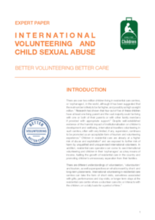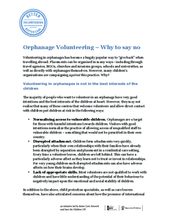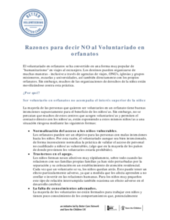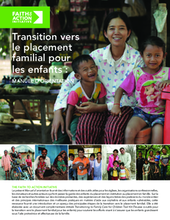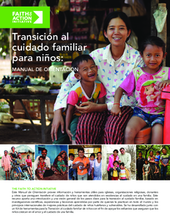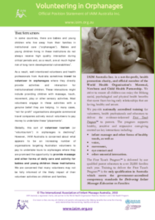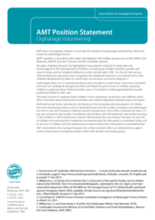Displaying 101 - 110 of 141
The London School of Economics Volunteer Centre and the Better Volunteering Better Care Initiative have collaborated to develop a pledge that can be adopted by universities and other institutions of higher or further education. By adding this pledge to their websites, universities and other supporters promise not to advertise orphanage volunteering trips to students and to “endeavour to ensure that such opportunities are neither facilitated nor promoted within our institution.”
This paper provides an overview of international volunteering, or “voluntourism,” and its potential vulnerability to child sexual exploitation, particularly in residential care centres.
A detailed explanation of the problems associated with volunteering in orphanages (residential care centers).
Using a practice approach focused on interactions between foreign volunteers and local staff, this study examined the impact of volunteer tourism on Zion Primary School and Tamale Children’s Home (an orphanage), both in Tamale, Ghana.
Este documento provee una explicación detallada de las razones que Better Volunteering Better Care está desalentando el voluntariado internacional en orfanatos (centros de atención residencial).
Le présent Manuel d’orientation fournit des informations et des outils utiles pour les églises, les organisations confessionnelles, les donateurs et autres acteurs qui font passer la garde des enfants du placement en institution au placement en famille.
This chapter first traces the etymology of the definition of “orphan” and its attendant “crises.” Then, using examples from Guatemala and Uganda, the authors consider how the idea of an “orphan crisis” has traveled from development to charitable responses and what effects this has on local child protection systems.
Este Manual de Orientación provee información y herramientas útiles para iglesias, organizaciones religiosas, donantes y otros que persiguen transferir el cuidado de niños que son atendidos en residencias al cuidado en una familia.
The International Association of Infant Massage in Australia has launched a position paper on volunteering in orphanages in order to address the problem of untrained volunteers being encouraged to conduct child care and infant massage practice in residential care centres, particularly in developing countries.
In this position statement, the Association of Massage Therapists (AMT) of Australia clearly states that it does not endorse orphanage volunteering, referring to the positions of the Better Care Network, UNICEF, Save the Children and the ChildSafe network.

